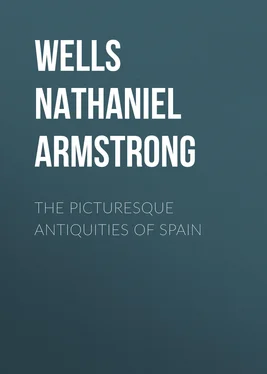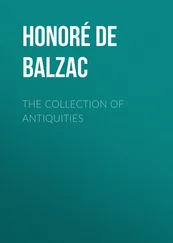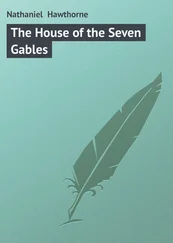Nathaniel Wells - The Picturesque Antiquities of Spain
Здесь есть возможность читать онлайн «Nathaniel Wells - The Picturesque Antiquities of Spain» — ознакомительный отрывок электронной книги совершенно бесплатно, а после прочтения отрывка купить полную версию. В некоторых случаях можно слушать аудио, скачать через торрент в формате fb2 и присутствует краткое содержание. Жанр: foreign_antique, foreign_home, visual_arts, на английском языке. Описание произведения, (предисловие) а так же отзывы посетителей доступны на портале библиотеки ЛибКат.
- Название:The Picturesque Antiquities of Spain
- Автор:
- Жанр:
- Год:неизвестен
- ISBN:нет данных
- Рейтинг книги:3 / 5. Голосов: 1
-
Избранное:Добавить в избранное
- Отзывы:
-
Ваша оценка:
- 60
- 1
- 2
- 3
- 4
- 5
The Picturesque Antiquities of Spain: краткое содержание, описание и аннотация
Предлагаем к чтению аннотацию, описание, краткое содержание или предисловие (зависит от того, что написал сам автор книги «The Picturesque Antiquities of Spain»). Если вы не нашли необходимую информацию о книге — напишите в комментариях, мы постараемся отыскать её.
The Picturesque Antiquities of Spain — читать онлайн ознакомительный отрывок
Ниже представлен текст книги, разбитый по страницам. Система сохранения места последней прочитанной страницы, позволяет с удобством читать онлайн бесплатно книгу «The Picturesque Antiquities of Spain», без необходимости каждый раз заново искать на чём Вы остановились. Поставьте закладку, и сможете в любой момент перейти на страницу, на которой закончили чтение.
Интервал:
Закладка:
At this hour each passenger is furnished with a candle, and requested to get up; and at a quarter to three the muchacha (chambermaid) reappears, bearing in her hand a plate, on which, after rubbing his eyes, the traveller may discover, if it be allowed so to speak, an imperceptible cup, a xicara ,—since, having the thing, they have a name for it, which is of course untranslateable,—of excellent chocolate, an azucarillo (almost transparent sugar prepared for instantaneous melting), a glass of water, and a piece of bread. After partaking of this agreeable refreshment, you have just time left to pay your bill, fold up your passport, which during the night has remained in the hands of the police, and to take your seat in the Diligence.
The towns of the Basque provinces appear not to have been much maltreated during the Carlist war; not so the villages, most of which present a melancholy aspect of ruin and desolation. The churches, built so as to appear more like keeps of castles, have mostly withstood the shock. The destruction was oftener the result of burning than of artillery. The lover of the picturesque offers his silent gratitude to the combatants on both sides, for sparing, although unintentionally, some of the most charming objects of all Spain.
Among the most striking of these is Hernani. It is composed of one street, of the exact required width for the passage of an ordinary vehicle. This street is a perfect specimen of picturesque originality. The old façades are mostly emblazoned with the bearings of their ancient proprietors, sculptured in high relief. On entering the place, the effect is that of a deep twilight after the broad blaze of the sunny mountains. This is caused by the almost flat roofs, which advance considerably beyond the fronts of the houses, and nearly meet in the centre of the street: the roof of each house is either higher or lower, or more or less projecting, than its neighbour; and all are supported by carved woodwork, black from age. The street terminates on the brow of a hill, and widens at the end, so as to form a small square, one retreating side of which is occupied by the front of a church covered with old sculpture; and the diligence, preceded by its long team of tinkling mules, disappears through the arched gateway of a Gothic castle.
In this part of Spain one does not hear the sounds of the guitar; these commence further on. On Sundays and holydays, the fair of Tolosa, and of the other Basque towns, flourish their castagnettes to the less romantic whinings of the violin; but, in traversing the country, the ear is continually met by a sound less musical, although no less national, than that of the guitar—a sort of piercing and loud complaint, comparable to nothing but the screams of those who have "relinquished hope" at Dante's grim gateway.
These unearthly accents assail the ear of the traveller long before he can perceive the object whence they proceed; but, becoming louder and louder, there will issue from a narrow road, or rather ravine, a diminutive cart, shut in between two small round tables for wheels. Their voice proceeds from their junction with the axle, by a contrivance, the nature of which I did not examine closely enough to describe. A French tourist expresses much disgust at this custom, which he attributes to the barbarous state of his neighbours, and their ignorance of mechanical art; it is, however, much more probable that the explanation given by the native population is the correct one. According to this, the wheels are so constructed for the useful purpose of forewarning all other drivers of the approach of a cart. The utility of some such invention is evident. The mountain roads are cut to a depth often of several yards, sometimes scores of yards, (being probably dried-up beds of streams,) and frequently for a distance of some furlongs admit of the passage of no more than one of these carts at a time, notwithstanding their being extremely narrow. The driver, forewarned at a considerable distance by a sound he cannot mistake, seeks a wide spot, and there awaits the meeting.
You need not be told that human experience analysed resolves itself into a series of disappointments. I beg you to ask yourself, or any of your acquaintances, whether any person, thing, or event ever turned out to be exactly, or nearly, such as was expected he, she, or it would be. According to the disposition of each individual, these component parts of experience become the bane or the charm of his life.
This truth may be made, by powerful resolve, the permanent companion of your reflections, so as to render the expectation of disappointment stronger than any other expectation. What then? If you know the expected result will undergo a metamorphosis before it becomes experience, you will not be disappointed. Only try. For instance,—every one knows the Spanish character by heart; it is the burden of all literary productions, which, from the commencement of time, have treated of that country. A Carlist officer, therefore,—the hopeless martyr in the Apostolic, aristocratic cause of divine right; the high-souled being, rushing into the daily, deadly struggle, supported, instead of pay and solid rations, by his fidelity to his persecuted king;—such a character is easily figured. The theory of disappointments must here be at fault. He is a true Spaniard; grave, reserved, dignified. His lofty presence must impress every assembly with a certain degree of respectful awe.—I mounted the coupé , or berlina , of the Diligence, to leave Tolosa, with a good-looking, fair, well-fed native, with a long falling auburn moustache. We commenced by bandying civilities as to which should hold the door while the other ascended. No sooner were we seated than my companion inquired whether I was military; adding, that he was a Carlist captain of cavalry returning from a six months' emigration.
Notwithstanding the complete polish of his manners in addressing me, it was evident he enjoyed an uncommon exuberance of spirits, even more than the occasion could call for from the most ardent lover of his country; and I at first concluded he must have taken the earliest opportunity (it being four o'clock in the morning) of renewing his long-interrupted acquaintance with the flask of aguardiente : but that this was not the case was evident afterwards, from the duration of his tremendous happiness. During the first three or four hours, his tongue gave itself not an instant's repose. Every incident was a subject of merriment, and, when tired of talking to me, he would open the front-window and address the mayoral ; then roar to the postilion, ten mules ahead; then swear at the zagal running along the road, or toss his cigar-stump at the head of some wayfaring peasant-girl.
Sometimes, all his vocabulary being exhausted, he contented himself with a loud laugh, long continued; then he would suddenly fall asleep, and, after bobbing his head for five or six minutes, awake in a convulsion of laughter, as though his dream was too merry for sleep. Whatever he said was invariably preceded by two or three oaths, and terminated in the same manner. The Spanish (perhaps, in this respect, the richest European language) hardly sufficed for his supply. He therefore selected some of the more picturesque specimens for more frequent repetition. These, in default of topics of conversation, sometimes served instead of a fit of laughter or a nap: and once or twice he hastily lowered the window, and gave vent to a string of about twenty oaths at the highest pitch of his lungs; then shut it deliberately, and remained silent for a minute. During dinner he cut a whole cheese into lumps, with which he stuffed an unlucky lap-dog, heedless of the entreaties of two fair fellow-travellers, proprietors of the condemned quadruped. This was a Carlist warrior!
Читать дальшеИнтервал:
Закладка:
Похожие книги на «The Picturesque Antiquities of Spain»
Представляем Вашему вниманию похожие книги на «The Picturesque Antiquities of Spain» списком для выбора. Мы отобрали схожую по названию и смыслу литературу в надежде предоставить читателям больше вариантов отыскать новые, интересные, ещё непрочитанные произведения.
Обсуждение, отзывы о книге «The Picturesque Antiquities of Spain» и просто собственные мнения читателей. Оставьте ваши комментарии, напишите, что Вы думаете о произведении, его смысле или главных героях. Укажите что конкретно понравилось, а что нет, и почему Вы так считаете.












